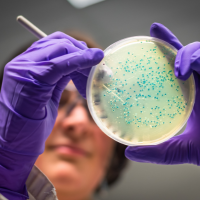The human microbiome, a set of microorganisms that colonize our body, plays an essential role in the health and balance of the skin. More than 100 trillion microorganisms, including bacteria, fungi and viruses, coexist in symbiosis with us, performing crucial functions. From the moment of birth, this colonization is essential for the development of effective immunological tolerance.
The term microbiome refers to communities of microorganisms (microbiota), their genomes, and their interactions in the human body. Although their composition is unique and variable, healthy microbiome patterns have been identified that play a key role in maintaining homeostasis. In areas exposed to the outside, such as the skin and mucous membranes, the microbiome is especially diverse and necessary to prevent the development of diseases.
The Skin Microbiome
The skin, our largest protective barrier, hosts a rich and varied population of microorganisms. It is estimated that around one million bacteria and multiple different species live in each cm2 of skin. Actinobacteria, Firmicutes, Proteobacteria and Bacteroidetes are the main phyla present in the skin, although their composition varies depending on factors such as the location, age, sex and health of each individual.
acne vulgaris
Acne, a common problem that mainly affects adolescents, is triggered by factors such as follicular hyperkeratinization, excessive sebum production, colonization by bacteria such as Cutibacterium acnes, and inflammation. The presence of C. acnes, a normal bacteria on the skin, is qualitatively different in people with acne compared to healthy individuals. This bacteria can trigger inflammation and form biofilms, making it more virulent and resistant to treatments.
The Role of Probiotics and Prebiotics
Probiotics, microorganisms beneficial to the host, and prebiotics, components that stimulate the growth of healthy microorganisms, have demonstrated positive effects in various dermatological diseases. In the case of acne, probiotics, whether in topical or oral applications, can act as an adjuvant therapy. These microorganisms help control bacterial growth, reduce inflammation, and minimize side effects associated with long-term antibiotic use.
Conclusion
The study of the microbiome is revolutionizing the approach to skin diseases, including acne. Understanding how microorganisms interact with our skin opens new doors for more effective and sustainable treatments. At our Aesthetic Medicine Clinic, specialized in minimally invasive procedures, we are committed to guiding you towards healthy and radiant skin, incorporating the latest advances in microbiome and dermatological treatments. Your skin deserves the best.


